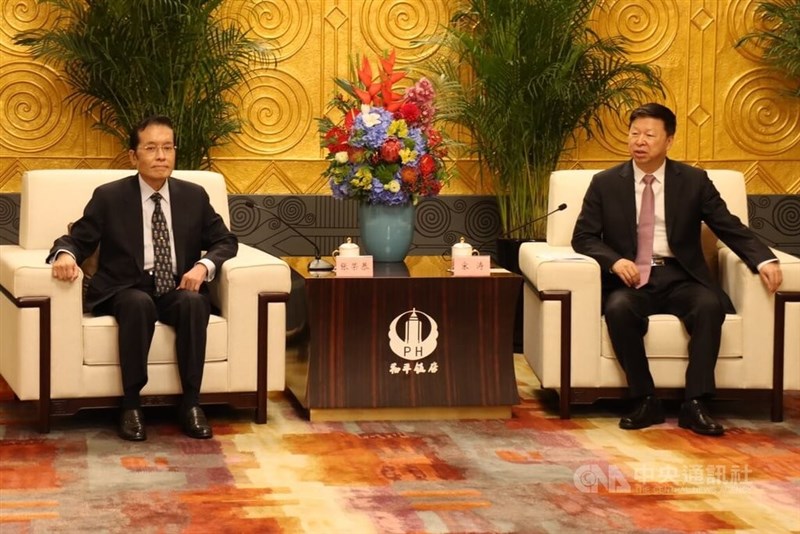'Authentic Taiwanese' should also be Chinese: KMT vice chair in Shanghai

Shanghai, Nov. 14 (CNA) Opposition Kuomintang (KMT) Vice Chairman Chang Jung-kung (張榮恭) on Friday paid an unannounced visit to Shanghai, where he met China's top Taiwan affairs official and said that "people who are authentic Taiwanese should also be openly and confidently Chinese."
Chang, who was appointed to his current post on Nov. 1 by newly elected KMT Chairperson Cheng Li-wun (鄭麗文) after she assumed office on the same day, made his first visit to China in his new capacity.
During the meeting with China's Taiwan Affairs Office (TAO) Director Song Tao (宋濤), Chang said that everyone in Taiwan "has a Chinese surname, speaks Chinese, celebrates Chinese festivals and worships Chinese deities."
"Therefore, people who are authentic Taiwanese should also be openly and confidently Chinese," he added.
Chang also cited Cheng's message to Chinese President Xi Jinping (習近平) -- who also serves as Chinese Communist Party (CCP) general secretary -- which said that "in 1992, the two sides of the Taiwan Strait reached a consensus under which they each orally expressed their adherence to the 'one China principle.'"
He said he believes this is the "1992 consensus in its original form."
The "1992 consensus" refers to a tacit understanding reached in 1992 between the then KMT government of the Republic of China (Taiwan) and the Chinese government. It has been consistently interpreted by the KMT as an acknowledgment by both sides that there is only "one China," with each side free to interpret what "China" means.
The independence-leaning ruling Democratic Progressive Party (DPP) has never acknowledged the "1992 consensus," arguing that Beijing allows no room for the interpretation of "China" as the Republic of China, and that acceptance of the consensus would imply agreement with China's claim over Taiwan.
Chang said that over the past three decades, Taiwan has seen changes in ruling parties, but "history has shown that only when the '1992 consensus' is upheld and Taiwan independence is opposed can cross-strait relations develop peacefully."
Chang noted that under its new leadership lineup, the KMT will be even more resolute in upholding its existing political foundation on cross-strait relations and will continue to promote peace and exchanges across the Strait.
In his remarks, Song reiterated that as long as the "1992 consensus" is upheld, there will be peace and stability in the Taiwan Strait and cross-strait relations can improve.
He described the "1992 consensus" as the shared political foundation between the CCP and the KMT, urging the two parties to strengthen exchanges and cooperation and to "jointly advance the process of national unification."
-
Politics
Two Taiwanese stranded in Israel amid conflict reach Jordan
03/02/2026 09:02 PM -
Business
124,000 Taiwanese have at least NT$100 million in assets: Report
03/02/2026 08:53 PM -
Society
Rain, cooler weather expected across Taiwan on Lantern Festival
03/02/2026 08:13 PM -
Society
Iran conflict to 'severely' delay Taiwan mail to 17 countries
03/02/2026 06:32 PM -
Cross-Strait
Iran could cloud Trump-Xi talks but unlikely to spark Taiwan war: Scholars
03/02/2026 06:13 PM